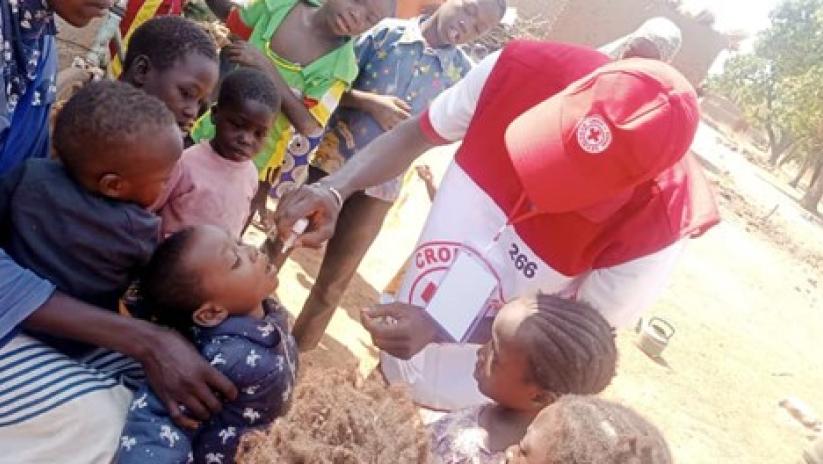
Community-based surveillance (CBS) is defined as the systematic detection and reporting of events of public health significance within a community by community members. It has been successfully used in many situations to strengthen existing health systems and is recommended by the World Health Organization (WHO) for the rapid detection of unusual events and diseases with epidemic potential in complex environments, displaced persons camps and during epidemics.
In view of the complex crisis context in which the country finds itself, the Burkinabe Red Cross has been implementing a community-based surveillance program in the health districts of Kaya, Fada and Ouahigouya since January 2021. It has set up an early detection and notification system based on specially equipped Red Cross volunteers. Unusual events and nine (9) diseases with epidemic potential, including acute flaccid paralysis (AFP), are currently monitored. These project volunteers contributed to the notification and confirmation of several AFP cases in the health districts of Fada (Tangaye) and Ouahigouya (Zimba and Koswende). This is well illustrated by data from the Ouahigouya health district's disease and event surveillance bulletin for epidemiological week 51. Of the 22 reported cases, CBS volunteers shared 9 alerts (suspected cases matching the community case definition), which was much higher than the district’s forecasted number of 6 suspected cases for 2022. Additionally, during the same period, epidemiological bulletins published regularly by the Ministry of Health reported several other cases of AFP in other health districts across the country, causing greater concern.
Faced with the re-emergence of these AFP cases, the Ministry of Health launched a national polio vaccination campaign. To help vaccinate as many children as possible, the Burkinabe Red Cross, through its community-based surveillance project, took part in the campaign.
Methodology
To achieve its objectives, the CRBF used several complementary strategies:
-
Systematic training and supervision of CBS volunteers and regular reporting and sharing updates with the Ministry of Health and Health Cluster
-
Mobilizing human resources (supervisors and volunteers) to support the vaccination campaign;
-
Participation (by supervisors and volunteers) in the various preparatory meetings organized in the respective CSPSs;
-
Door-to-door outings by volunteers working in pairs with ABSCs;
-
Financial support to the district with fuel for supervision and movement for the vaccination teams.
Results
The campaign ran from November 25th- 28th, 2022, and immunized over 4 million children aged 0 to 59 months nationwide.
All mobilized volunteers and supervisors took part in the preparatory meeting, which enabled operational planning of campaign activities. There were 99 Ninety-nine (99) volunteers and 2 supervisors mobilized over 4 days. Some volunteers played the role of community mobilizers, helping to raise awareness in the community to improve vaccine uptake. Others acted as vaccinators, helping to administer the vaccine directly to children. Volunteers contributed to the vaccination of a total of 29,570 children. The contribution of the 4 Red Cross volunteers mobilized at the CSPS in sector 11, for example, was estimated at 1,000 children. In other words, 1,000 children would not have received the vaccine and would therefore have been exposed to AFP, had the volunteers not been mobilized to support the CSPS in sector 11 in Fada. In addition, the district's support in terms of fuel made a major contribution to the quality of the campaign by enabling supervision visits to the CSPSs.
Discussion
These outings were greatly appreciated by both parties, i.e. the Ministry of Health and the CRBF. Looking at the success of this immunization program, the health players involved unanimously welcomed the CRBF's support, and communicated their hope that it would be repeated in the future. Secondly, the volunteers (some of whom were first timers) expressed a certain moral satisfaction at having contributed to saving lives, while the ASBCs greatly appreciated the collaboration with the volunteers, which facilitated and reduced their workload. Similar results were achieved by the CRBF in the Boucle du Mouhoun and Hauts-Bassin regions in 2021, where joint volunteer-ASBC outings were greatly appreciated by stakeholders. The introduction of specific tools will make it possible to calculate the volunteers' total contribution to the campaign, so as to better estimate the CRBF's contribution.
Conclusion
CRBF's support to the Ministry of Health for early detection and subsequent participation in the polio vaccination campaign enabled several thousand children to be vaccinated. The health authorities collaborated successfully and allocated volunteers to efficiently achieve these goals. Moreover, authorities repeated similar projects in the future.



